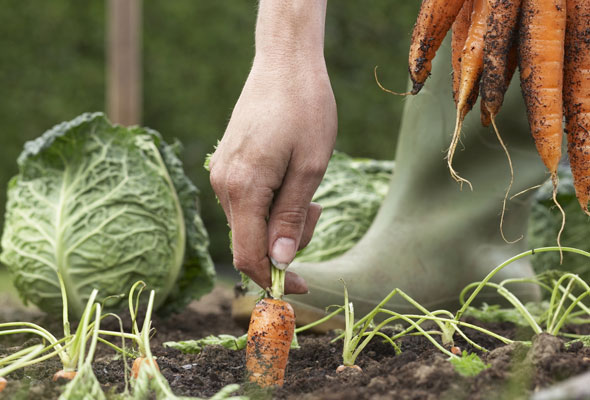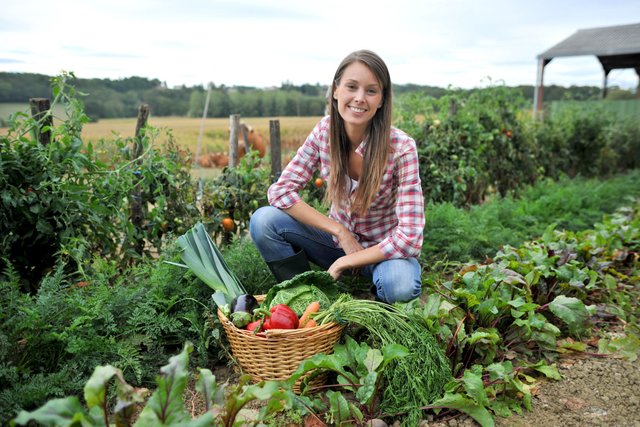Organic Gardening For Beginners
For some people, gardening is a passion. Some people garden just as a hobby. For still others, it’s a way to feed their families. We think Shirley MacClaine’s character in “Steel Magnolias” said it best. “Because that’s what Southern women do – we wear funny hats and grow things in the dirt.”

You don’t have to be from the South or be a woman, or even wear a funny hat to enjoy gardening. The thrill of seeing your first red, ripe tomato or watching your first stalk of corn reach from the ground can be an amazing experience for many people.
Gardening is also a great way to provide healthy food for you and your loved ones. When you buy produce from the store, it just isn’t the same as presenting a salad to your family that came exclusively from your garden worked by your own two hands.
Many people choose to garden so they can have control over what type of food they eat without fear of chemicals or preservatives. Often, commercially grown produce is cultivated in greenhouses with the use of pesticides and chemicals to enhance their growth.

A quick study on these types of artificial applications can be unnerving for anyone. The side effects of chemical pesticides on the human body can truly take its toll. So many people are jumping on the “organic bandwagon” as a way to minimize the risks to themselves and their loved ones that often comes with commercially prepared foods.
You don’t have to be a health nut to embrace organic gardening. Imagine the wonderful way you’ll feel knowing that you are serving foods that were grown all naturally without the risks that come from applying chemical fertilizers and pesticides.
It’s easier than you think. If you’ve been gardening for years or are just beginning to grow your own food, organic gardening can provide you with peace of mind and pride in your produce. Don’t have any clues how to start? That’s why you’re reading this book!
We will explore the advantages of organic gardening as well as the best way to begin your all-natural garden. We’ll give you ideas about mulching, weed control, and composting. Plus, we’ll give you some ideas on all-natural pest controls and ways to make sure your garden thrives – without chemicals!
Let’s begin our journey into “Organic Gardening for Beginners”!
WHY GARDEN ORGANICALLY?
As recent as 25 years ago, the idea of organic gardening was considered quite a radical concept. How in the world were gardeners expected to control the weeds, the bugs, and the animals that could threaten a thriving garden without the use of man-made chemicals?
When you think about it, organic gardening is a really simply theory. For years, people have been growing things without the use of chemicals. The early settlers of our country didn’t have Miracle-Gro or Sevin Dust and they made out just fine.
It only makes sense that we should be able to apply the same techniques and get the same results as they did today. We should grow food using Mother Nature's ingredients rather than concoctions born in a chemist's laboratory for the good of all of us.
But the interest in organic gardening goes beyond just the benefits for us and our families. There has been a rise in the interest of ecology and concern about the environment that has given new life to the renewed interest in this form of gardening. By using natural minerals and materials, by taking advantage of natural predators, and by recycling garden waste, the home gardener can maintain an organic garden quite successfully.
There are many, many advantages to gardening organically. Probably first and foremost is that Food produced using organic agriculture is more nourishing and more healthful.
In early August, 2001, the British organization, The Soil Association, reported that a comprehensive review of existing research revealed significant differences between organically and non-organically grown food. These differences relate to food safety, primary nutrients, secondary nutrients and the health outcomes of the people who eat organically
Vitamin C and dry matter contents are higher, on average, in organically grown crops then they are in non-organic crops. Mineral contents are also higher, on average, in organically grown crops. Food grown organically contains "substantially higher concentrations of antioxidants and other health promoting compounds than crops produced with pesticides
Many people think that organically grown foods taste better. Also, some foods grown without pesticides produce a higher amount of an anti-oxidant that has been found to reduce the risk of some cancers.
Overall, though, most people who enjoy organic gardening report that the enjoyment they derive is paramount to their decision to eschew chemicals in favor of the all-natural route. Many people like to watch the tender new growth come to full maturity and, as a bonus, you get to eat it!
With organic gardening, you get extra fresh vegetables. Naturally, corn on the cob and newly picked peas are especially noticeable, but this trait extends to all vegetables you grow yourself, especially under the organic method. A phenomenon noted by most people when harvesting their very first vegetables from their very first garden is that everyone eats much more of a given vegetable than they would of a similar store bought variety.
You will save money not only by growing your own food, but you can even make a little extra cash on the side by selling your own all-natural foods that are so popular in the grocery stores these days. If you have canned all the tomatoes you can and still have bushels left over, you can take the extra to the farmer’s market and sell your organic tomatoes to others who don’t have the advantage of their own garden.
For any gardener who still hasn't been convinced about the need to garden organically, here are some statistics that may help change your mind. In March of 2001, the American Cancer Society published a report linking the use of the herbicide glyphosate (commonly sold as Round-up) with a 27% increased likelihood of contracting Non-Hodgkins Lymphoma.
John Hopkins University also revealed that home gardeners use almost 10 times more pesticide per acre than the average farmer and that diseases caused by environmental illness, exposure to chemicals etc., is now the number one cause of death in the U.S. With the EPA's recent phasing out of common pesticides such as Dursban and Diazinon, we are now realizing that many of the chemicals that we thought were "safe" were never actually tested to see what their affect on children, women, and the elderly could be. The time has come to reassess our dependence on pesticides.
However, you may be asking why are chemicals so bad if we’ve been using them for years and years?
For more information and details please click here : http://www.mediafire.com/file/gu13u281bd4bf6x/organicgardening.pdf
Hi! I am a robot. I just upvoted you! I found similar content that readers might be interested in:
http://www.greenlivingkit.com/Organicforbeginners.pdf